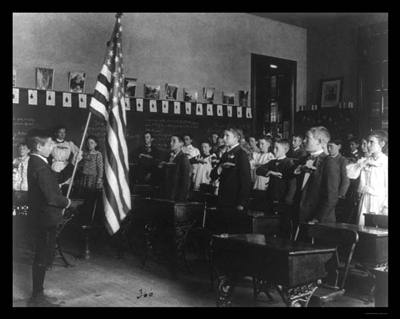Althusser begins his chapter on Ideological State Apparatuses (ISA) with a reference to Marx: As Marx said, every child knows that a social formation which did not reproduce the conditions of production at the same time as it produced would not last a year (p 100). Obviously, the reference to children is to highlight the supposed obviousness of the statement, but I think that through addressing children and education we can examine issues of reception and “the state”.
When talking about the “thingness” of the state (Routledge), and the ways in which the state makes itself felt (materialization through symbols, aesthetics, military action, production of space, etc.), we risk the fallacy of also taking a top-down approach to the question of reception. I fear that in talking about how the state asserts itself (of course, this is under the assumption that the state is an entity which can perform action on others—whether in keeping with Rougledge, we identify it as a continuous process of making and reasserting, or Gramsci and Weber and identify as “state as thing”) we fail to consider how those performances are felt “on the ground”. Like the trajectory our conversation in class took last week, I will shy away from questions about what a state is and rather address questions about how a state functions (or not, as the case may be).
I hope to make my point clearer by way of a personal anecdote: I was educated at a public elementary school in a middle-class Massachusetts suburb. Every morning, from the time I was in first grade to the time I was in the fourth, we would begin the day by collectively saying the Pledge of Allegiance and singing “My Country ‘tis of Thee”. According to Althusser, education is an ISA which functions through schools, and I would argue that having the Pledge of Allegiance be an intergal part of my early education is not a subtle form of indoctrination to the state. However, although I would put my right hand over my heart and speak the words I was tought to say, I had no concept of their meaning or significance. In fact, I had no idea what a Republic was and I can’t say how many of my peers couldn’t pronounce “indivisible”, let alone grasp its meaning. Certainly, this was a performance of community and unity, but we could just as well have sung “Old MacDonald” every morning and felt the same sense of belonging.

This brings me to the point of reception. While it is clear that the state was performing on our young, susceptable minds, we did not receive the intended message. How can we be sure that the materializations and performances of “the state” were received by the intended audience in the intended fashion? Unfortunately, there are few means of identifying reception archaeologically. Examples from Roman Provncial coinage show new symbols introduced are labelled so the audience can appropriately interpret them, but this is more an indication of explicit communication than “correct” reception. We might be better suited to look for evidence of resistance to the dominant materializations of the state—as negative reception--but this too is complex.
What I am advocating is that, in accordance with the suggestions of several scholars on state formation and function, we look at these processes as dynamic, even if it is difficult to see the other side of the equation. A state, as an entity, is only effective if it can assert itself. It cannot persist if its constituents are not receptive to it.
Posted at Sep 27/2007 02:44PM:
Brad: Keffie, nice piece. I have a question, though. While your example says that you didn't actively understand the intent behind state activity as a kid, you say that a state is only effective if it its constituents are receptive. Do you consider not understanding intent as not receptive, or do you see the mere act of performance - any performance - as a community forming, and thereby state supporting act?
